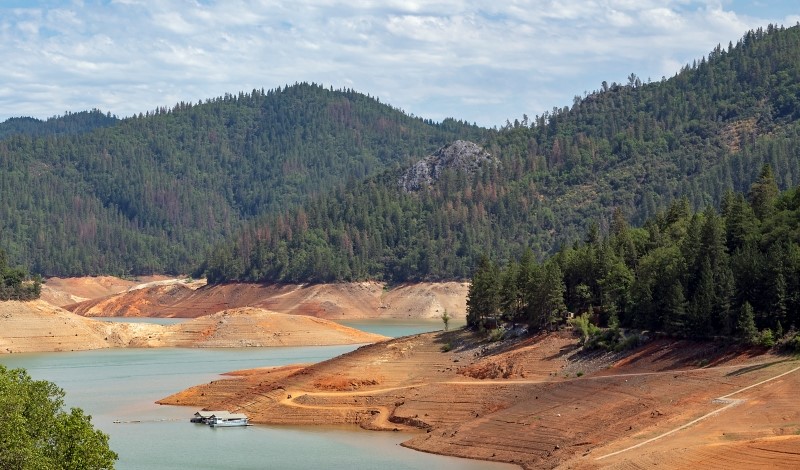
Scholars explore the regulatory issues surrounding water rights nationally and internationally.
Water is a key ingredient for all life on earth, including human life. Yet only 0.5 percent of water on Earth qualifies as available, usable freshwater. And global climate change will continue to threaten the existing level of freshwater.
As glaciers melt and sea levels rise, coastal groundwater salinizes, threatening the existence of ecosystems and communities. As temperatures rise, extreme weather events such as floods and droughts become more severe and more likely.
In a warming world, droughts have worsened as rising temperatures increase evaporation and decrease the likelihood of rain or snow touching the ground.
Low snowpack and precipitation—combined with extreme heat—causes dry soil, tree death, and decreased streamflow. A parched landscape equates to more fuel for wildfires since dry grasses and trees are more flammable. Then when wildfires inevitably ignite, they spread faster, burn hotter, and cost more to extinguish.
In addition, as the volume of water decreases, less water is available to dilute the pollutants already present. Ultimately, falling water levels in reservoirs or water tables endanger both human health and the environment. This uncertainty about and scarcity of water pushes the question of regulation and rights into the spotlight.
In this week’s Saturday Seminar, experts explore the regulatory challenges confronting the world regarding rights to an increasingly scarce supply of water.
- The current international water law regime is incapable of providing an effective and equitable means for the use of transnational waters claim Isabelle Blacketer, solicitor at King & Wood Mallesons, Fiona Luu, an associate at LK Law, and Paul Babie, a law professor at the University of Adelaide in an article in the Michigan State Law Review. Nevertheless, Blacketer and her team note that the Berlin Rules on Water Resources advanced the existing framework. They state that those rules prescribe the principle of reasonable and equitable water management and the obligation not to cause significant harm to other co-riparian states in water exploration.
- In a forthcoming article in the Harvard Environmental Law Review, Karrigan Börk of the University of California Davis School proposes a water rights exactions framework to deal with the externalities of water withdrawals. Börk argues that agencies should impose fees for permits for both new and existing water rights so the cost of water overuse will be shouldered by the specific user rather than the general public. He claims this measure can induce more efficient use and distribution of limited water resources. Börk also notes that his proposal ensures distributional fairness because it requires beneficiaries of water rights to account for the non-monetary social costs associated with water exploration.
- In a recent paper, Robin Kundis Craig of the University of Southern California Gould School of Law discusses two major problems confronting the United States’ response to climate change in the area of water law. The nation’s climate diversity and multi-jurisdictional legal system complicates water rights governance, Craig argues. Craig discusses the scholarly attention to these problems as they pertain to the American West, but she argues that more attention should be devoted to studying the eastern United States and tribal water management.
- Samuel T. Ayres, a recent graduate of Yale Law School, argues in a recent article in the Yale Law Journal that the prevailing view of state water rights threatens to derail successful water management when it is most needed. Ayres argues that many scholars are wrong to believe that states are wrong to claim proprietary ownership over their groundwater reserves. At a time when groundwater reserves are both depleting and essential to the future of water governance, Ayres explains that such proprietary ownership of groundwater by states will improve water management.
- In an article in the Michigan Journal of Environmental and Administrative Law, Paul Babie of the University of Adelaide Law School and his coauthors describe the implications of a rise in private property approaches to water governance. Babie and his team draw lessons from Australia’s approach to what they call “unbundling,” a policy in which the constituent parts of water rights are fragmented and allocated. Although their analysis uses Australia as a case study, Babie and his team explain how the lessons can be applied to any semi-arid environment, including the southwestern United States.
- In an article in the Michigan State Law Review, Duane Rudolph of the University of Maine Law School examines the relationship between public values and private property rights in water governance. Rudolph argues that water belongs to the public and that the public, through regulators, should assert its right to regulate water during times of emergency. Although Rudolph acknowledges that many water resources are privately owned, he asserts that these rights must give way to public need when the circumstances require. He notes that California, as a user of both riparian rights and appropriations, allows water rights holders the right to use the water while the water itself remains publicly owned.
- In a forthcoming article in the Stanford Law Review, Sharmila L. Murthy of the Northeastern University School of Law argues that the basic tenets of utility law have prevented water utilities from addressing affordability. Murthy proposes the development of a model state law through the Uniform Law Commission. Murthy examines three jurisdictions—Philadelphia, Atlanta, and California—that demonstrate that a model state law would enable utilities to use water revenues to fund affordability programs and cross-subsidize low-income rates. The model law, Murthy concludes, would help guarantee all Americans access to affordable and clean water.
The Saturday Seminar is a weekly feature that aims to put into written form the kind of content that would be conveyed in a live seminar involving regulatory experts. Each week, The Regulatory Review publishes a brief overview of a selected regulatory topic and then distills recent research and scholarly writing on that topic.



